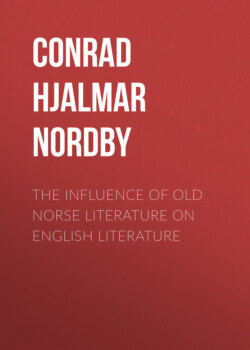Читать книгу The Influence of Old Norse Literature on English Literature - Conrad Hjalmar Nordby - Страница 11
На сайте Литреса книга снята с продажи.
GEORGE HICKES (1642–1715).
ОглавлениеTable of Contents
The next book in the list that contains an English contribution to the knowledge of our subject is the Thesaurus of George Hickes. On p. 193 of Part I, there is a prose translation of "The Awakening of Angantyr," from the Harvarar Saga. Acknowledgment is given to Verelius for the text of the poem, but Hickes seems to have chosen this poem as the gem of the Saga. The translation is another proof of an antiquarian's taste and judgment, and the reader does not wonder that it soon found a wider audience through another publication. It was reprinted in the books of 1716 and 1770 in the above list. An extract or two will show that the vigor of the old poem has not been altogether lost in the translation:
Hervor.—Awake Angantyr, Hervor the only daughter of thee and Suafu doth awaken thee. Give me out of the tombe, the hardned [9] sword, which the dwarfs made for Suafurlama. Hervardur, Hiorvardur, Hrani, and Angantyr, with helmet, and coat of mail, and a sharp sword, with sheild and accoutrements, and bloody spear, I wake you all, under the roots of trees. Are the sons of Andgrym, who delighted in mischief, now become dust and ashes, can none of Eyvors sons now speak with me out of the habitations of the dead! Harvardur, Hiorvardur! so may you all be within your ribs, as a thing that is hanged up to putrifie among insects, unlesse you deliver me the sword which the dwarfs made … and the glorious belt.
Angantyr.—Daughter Hervor, full of spells to raise the dead, why dost thou call so? wilt thou run on to thy own mischief? thou art mad, and out of thy senses, who art desperatly resolved to waken dead men. I was not buried either by father or other freinds. Two which lived after me got Tirfing, one of whome is now possessor thereof.
Hervor.—Thou dost not tell the truth: so let Odin hide thee in the tombe, as thou hast Tirfing by thee. Art thou unwilling, Angantyr, to give an inheritance to thy only child? …
Angantyr.—Fals woman, thou dost not understand, that thou speakest foolishly of that, in which thou dost rejoice, for Tirfing shall, if thou wilt beleive me, maid, destroy all thy offspring.
Hervor.—I must go to my seamen, here I have no mind to stay longer. Little do I care, O Royall friend, what my sons hereafter quarrell about.
Angantyr.—Take and keep Hialmars bane, which thou shalt long have and enjoy, touch but the edges of it, there is poyson in both of them, it is a most cruell devourer of men.
Hervor.—I shall keep, and take in hand, the sharp sword which thou hast let me have: I do not fear, O slain father! what my sons hereafter may quarrell about. … Dwell all of you safe in the tombe, I must be gon, and hasten hence, for I seem to be, in the midst of a place where fire burns round about me.
One can well understand, who handles the ponderous Thesaurus, why the first English lovers of Old Norse were antiquarians. "The Awakening of Angantyr" is literally buried in this work, and only the student of Anglo-Saxon prosody would come upon it unassisted, since it is an illustration in a chapter of the Grammaticæ Anglo-Saxonicæ et Moeso-Gothicæ. Students will remember in this connection that it was a work on poetics that saved for us the original Icelandic Edda. The Icelandic skald had to know his nation's mythology.
